
French Minister for Justice Rachida Dati.
When French Justice Minister Rachida Dati on Monday ordered an appeal to a court decision annulling a Muslim couple's marriage on the grounds that the wife had lied about being a virgin before the wedding, the acclaim was almost universal. The ruling's logic — essentially creating the legal concept of chastity fraud — was widely seen as an attack on women's rights that undermined decades of progress on sexual attitudes. The lower court's ruling seemed as well to have put Muslim religious concerns above France's strictly secular laws. But for the woman whose public repudiation sparked the controversy, Dati's decision means something else: the prolongation of a humiliating process to get her out of an unwanted marriage.
"Despite everything, my client was quite pleased with the [original] ruling because it allowed her reclaim her liberty," the woman's lawyer, Charles-Edouard Mauger, told the daily Le Figaro when asked why he hadn't appealed a verdict that France's secretary of state for urban affairs, Fadela Amara, reviled as "a fatwa against the emancipation of women." While Mauger was unable to speak to TIME on Tuesday, his colleagues following the case acknowledged their client was "traumatized to learn the Justice Ministry had ordered an appeal, because all she wants is this marriage over, this terrible attention and pressure off her, and to get on with her life as a free, single woman."
Until the state's challenge is heard, however, the woman — identified only as a 25-year-old nursing student from northern France — is condemned to play the role of symbol for the many forces that have seized her case as a major cause. The storm broke out last Thursday, when France's national media picked up on the unpublicized April 1 verdict annulling the couple's 10-month marriage on the husband's complaint that his wife's prenuptial assurances of virginity were false. The judge had reasoned that the wife's claimed virginity constituted "an essential quality decisive for the consent of her husband to wed." That, protestors argued, reduced the woman — and by extension all women — to the status of goods whose acquisition could be renounced by husbands claiming to have discovered hidden impurities or defects in them.
"We know that women's rights are never secured, but we never thought we'd see such regression in our country," reacted Martine Aubry, the Socialist mayor of Lille, where the case was heard. France's conservative secretary of state for social solidarity, Valérie Létard, called the decision "an attack on the integrity of women and a violation of the fundamental rights of all individuals."
The fact that both husband and wife are Muslim further fueled the controversy. Though religion was never cited in the litigation or ruling, the case played into broad concern in France over the spreading influence of Islam. "These strong reactions across all France demonstrate the difficulties we're experiencing in our relationships between our societies and Islam," said French Urban Affairs Minister Christine Boutin Monday on RTL radio. She added that had the case not involved Muslims, it wouldn't have generated the same emotions in a country where over 700 marriages are annulled by courts every year.
Boutin's view is supported by controversial Islamic scholar Tariq Ramadan, whose views on Islam's place in the West have often swept him into the media's glare. "People don't realize how damaging it can be to be reduced to a symbol, and have the elements of your life and humanity ignored in favor of stereotypes," says Ramadan. "I hope this woman quickly regains her right to tranquility, independence, and her own identity so she can just go back to living her own life."
